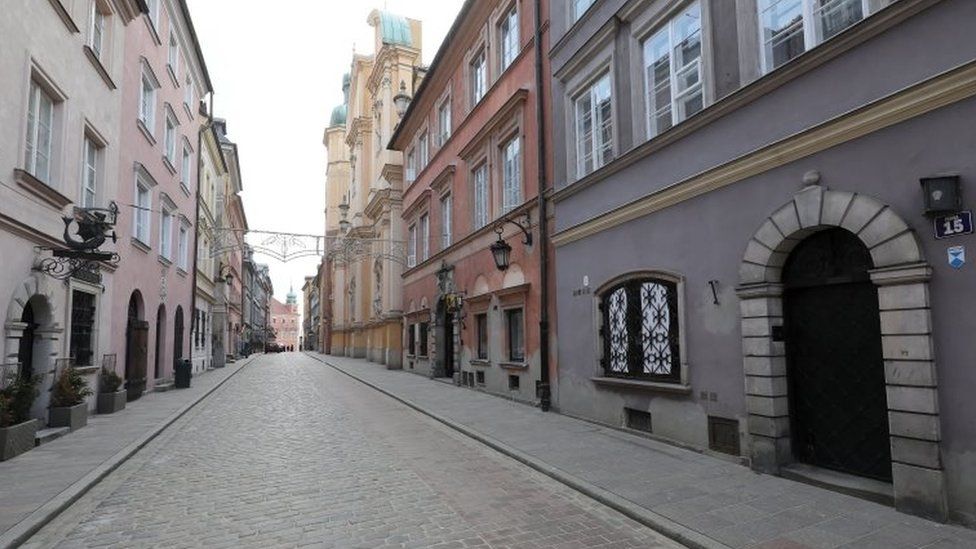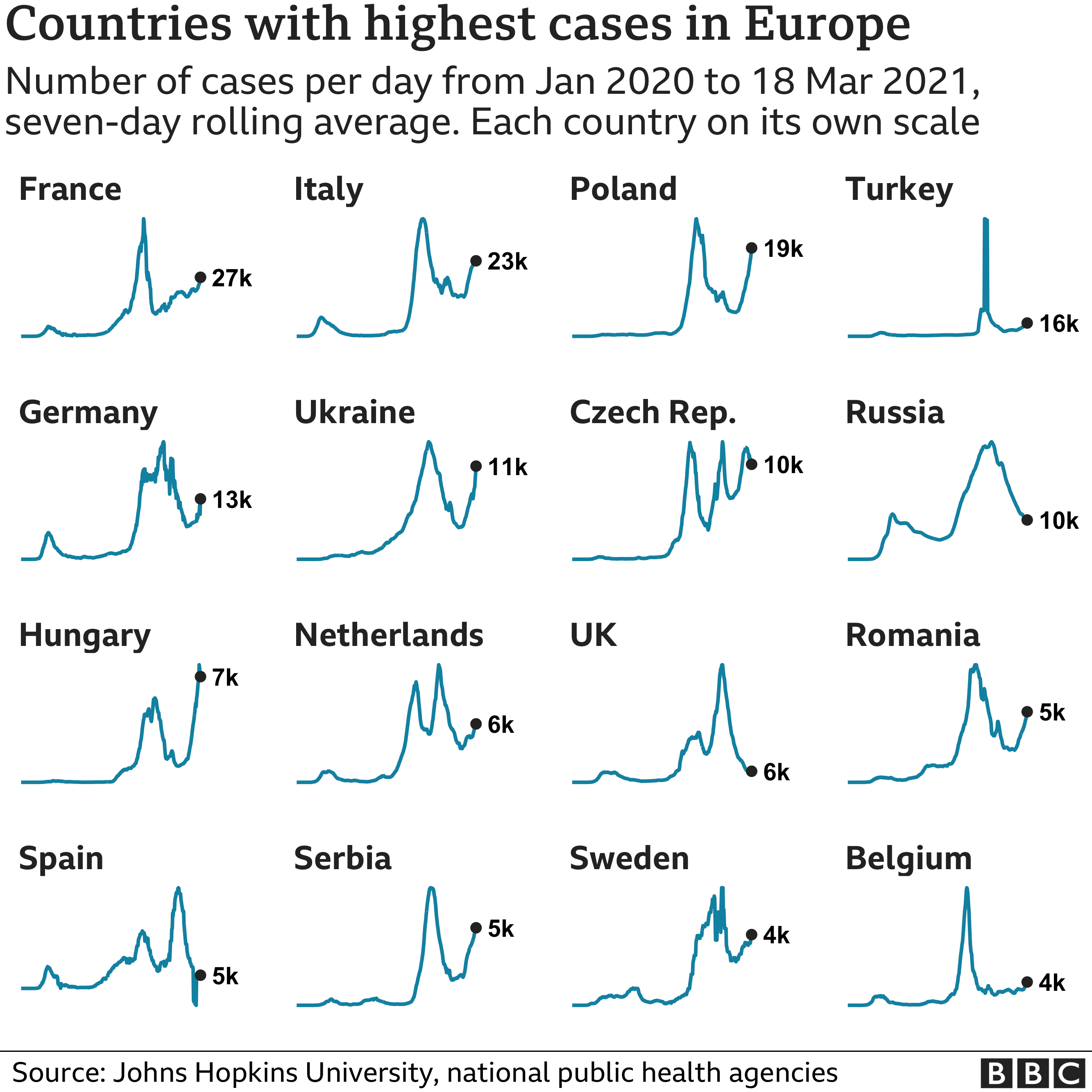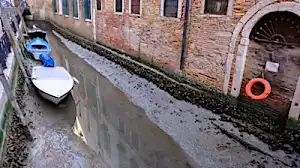Covid: France and Poland increase lockdown measures as infections surge
France and Poland have reintroduced partial lockdowns as both countries battle a sharp rise in Covid infections in recent weeks.
Some 21 million people in 16 areas of France, including the capital Paris, are affected as the country fears a third wave.
In Poland, non-essential shops, hotels, cultural and sporting facilities are now closed for three weeks.
The country has the highest new daily rates of Covid cases since November.
Coronavirus cases are also rising exponentially in Germany, with Chancellor Angela Merkel warning it is likely that the country will now need to apply an "emergency brake" and re-impose lockdown measures.
The vaccine rollout across the European Union has been hindered by delayed deliveries, as well as the suspension in several countries of the use of the Oxford-AstraZeneca Covid-19 vaccine, over fears of possible side effects.
Meanwhile demonstrations against coronavirus restrictions have affected several European cities.
In Amsterdam, police fired water cannon to clear protesters from Museum Square, a frequent venue for unauthorised demonstrations. Online footage showed a police dog handler prodding a woman in the chest with his baton and twice hitting a man who tried to protect her.
And in the central German city of Kassel, police said they used pepper spray and batons to disperse demonstrators who tried to break through a cordon. Video footage posted on social media showed water cannon also being deployed.
Protesters were also detained during an anti-lockdown protest in Hyde Park, London, and several thousand people gathered to protest against Covid restrictions in the small Swiss town of Liestal, near Basel.
Demonstrations were also reported in Berlin, Helsinki and Vienna.
What's the situation in France and Poland?
In France, the partial lockdown took effect from midnight on Friday.
Trains leaving Paris for parts of the country where lockdown restrictions do not apply, such as Brittany and Lyon, were reportedly fully booked hours before the measures were due to come into effect.
Traffic jams were reported on several roads leaving the capital.
The new restrictions are not be as strict as the previous lockdown, with people allowed to exercise outdoors.
Non-essential businesses are shut, but schools remain open, along with hairdressers if they follow a "particular sanitary protocol".
France has reported more than 4.2 million infections since the start of the outbreak, with nearly 92,000 Covid-related deaths, according to the data compiled by Johns Hopkins University in the US.
A lighter lockdown for France
The new lockdown measures are set to last at least four weeks. Paris and its surrounding region, the area around Nice and large parts of northern France are all affected.
It is a lighter lockdown than the two previous ones, with the main difference being that during the day people can go outside for exercise for as long as they like. Schools are also staying open.
But leaving the city for the countryside is not allowed, and yesterday there was heavy congestion on the roads and the trains as some Parisians got out while they could to non-lockdown zones.
Many in France find the bureaucratic approach of the government annoying, if predictable.
The rules on the high street are also opaque. While clothes and DIY shops are shut, hairdressers, bookshops, cobblers and florists are open.
In Poland, the three-week lockdown began on Saturday.
Polish health officials earlier warned the nationwide restrictions were necessary because of a rampant British variant of Covid-19 in the country. The variant now makes up more than 60% of infections.
Poland has had more than two million confirmed infections, and nearly 49,000 deaths, according to Johns Hopkins University.
Germany said on Friday it was now classifying neighbouring Poland as high risk. This means that from Sunday anyone crossing the border from Poland must provide a negative coronavirus test.
What's the latest on the AstraZeneca vaccine?
Despite assurances from the European medicines regulator that the AstraZeneca vaccine is safe and effective, some countries remain reluctant to resume their campaigns using the jab.
Germany, Italy, France, Spain and the Netherlands are among the countries that have restarted their AstraZeneca vaccination campaigns.
Health authorities in France have recommended that the vaccine be offered only to people aged 55 and over.
Finland's health authority has announced a pause in its use of the vaccine that will last at least a week. That move, which follows two reports of blood clots in patients who had received the jab in the country, was said to be a precautionary measure.
Meanwhile, Sweden, Denmark and Norway said on Friday that they needed more time to determine whether they should resume AstraZeneca inoculations.
On Saturday, Denmark said that two members of hospital staff in Copenhagen had developed blood clots after receiving the AstraZeneca vaccine.
The European Medicines Agency (EMA) has reviewed the vaccine over fears of a link to blood clots and found the jab was "not associated" with a higher risk of clots.
The World Health Organization (WHO) has also urged countries to continue using the AstraZeneca vaccine.
On Friday, experts at the WHO said the vaccine had "tremendous potential to prevent infections and reduce deaths across the world".
Professor Sir John Bell, from the UK government's vaccine taskforce, said France's refusal to administer the AstraZeneca vaccine to under-55s was "really damaging people's confidence in vaccines generally".
"It doesn't make any sense, the whole thing looks completely crackers," he told the BBC Radio 4 Today programme.
"If there are clotting problems associated with the vaccines - I am not saying there are, but if there were - they are at a very tiny level compared with the problems you get if you get the disease. If you want to die of a clot, get Covid."



















No comments